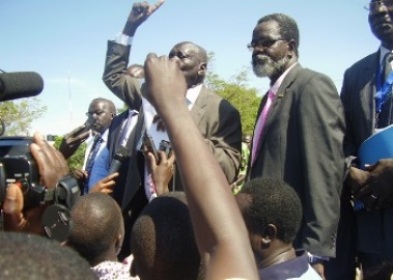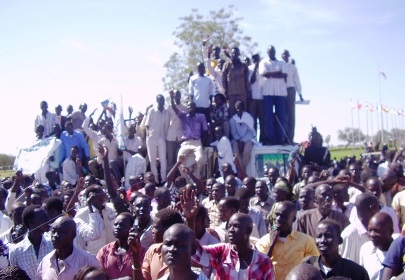Juba protestors speak out against demilitarised zone deal with Khartoum
October 15, 2012 (JUBA) – A large crowd of civil right activists and residents of South Sudan’s Northern Bahr el Ghazal state on Monday staged a peaceful procession in Juba, waving placards and banners demanding the “immediate removal” of the 14 mile area from the Safe Demilitarized Buffer Zone (SDBZ) and from the next round of talks, as they see it as an encroachment upon their land.

Protests were broken up by police using live rounds in Juba on Monday.
Heglig, otherwise known as Panthou by many South Sudanese, is an area which South Sudan claims is part of Warrap state and its northern neighbour claims is part of South Kordofan. Its oil field was captured by the South Sudan army (SPLA) in 2012, which then retreated after a 10-day battle with Khartoum’s forces (SAF).
Juba and Khartoum were brought back from the brink of all-out military conflict with a series of peace negotiations culminating in the signing of agreements in September, covering a wide range of issues. However, the fate of Heglig remains undecided and Khartoum rejected Juba’s proposal to accept the mediator’s Abyei proposal.
The AUHIP proposal calls to organise a referendum in Abyei with the participation of the few Misseriya residing there Khartoum rejected the proposition and reiterated its support to a previous proposal the mediation made in 2010 suggesting to divide the area between the two parties.
South Sudan parliament on Monday received a briefing from president Salva Kiir who called on the house to approve the deal, explaining that endorsement of the deal was the reason for which the government cut short recess of the members of the assembly in their constituencies, because “the agreement needs to be ratified so that negotiators goes back to resume discussions on the other remaining issues with the government of Sudan.”
Acuil Dut, a native of Northern Bahr el Ghazal residing in Juba told Sudan Tribune on Monday at a demonstration outside parliament that, “I can’t contain my feelings anymore. I was not expecting our government to give out our land just like that because of oil. This is no longer acceptable. We will not accept it.. He described how the events reminded him of his childhood, fleeing his home from Khartoum-backed militiamen men.

Former Aweil North county commissioner, Deng Thiep Akok, said the demonstrators went out to peacefully share their dissatisfaction with the government about their observations on the security arrangements and to send a clear message that the agreement is “unpopular”.
Akok disputed claims that the agreement has not been understood and the assertion from governmental officials in Juba that the protests were orchestrated by members of the governing Sudan People’s Liberation Movement (SPLM) in Northern Bahr el Ghazal in order to satisfy their own political interests.
On 5 October Juba announced it had formed a high-level committee to conduct an education programme detailing the border and oil issue deal signed with Sudan on 27 September, targeting government officials as well as the civil population.
Akok called on the members of parliament from the border states to not endorse the security arrangements, particularly article three, which establishes and operationalises the buffer zone.
Michael Makuei Lueth, minister of parliamentary affairs, who also chairs South Sudan’s border committee, said in a statement on Monday that the agreement has been misunderstood but that will not stop them from continuing with negotiations.
Lueth also said those opposed to the agreement are “a minority and they do not read the agreement or understand it […] when we signed the CPA [Comprehensive Peace Agreement] in 2005 there were small groups who opposed it, but in the end they celebrated with us when we voted for independence”.
James Wani Igga, speaker of the house, also argued that the buffer zone was temporary and would allow the deployment of the joint border monitoring mission in the area in a speech in the house on Monday.
“I think this point has to be crystal clear and properly underlined to leave no cloud or doubt and uncalled for speculations. This is not South Sudan alone. It includes some parts of Sudan at the border and at the border claimed or contested areas. It is not South Sudan alone,” said Igga.
“Our people must rest assured that their government together with parliament and the SPLM will never and never give away an inch of the territory of South Sudan,” Igga reasserted.
Despite widespread opposition to aspects of the Juba-Khartoum agreements, it was officially endorsed by the four Greater Bahr el Ghazal states earlier this month.
(ST)
